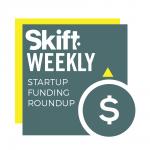Skift Take
This week, travel startups announced more than $100 million in funding. One company to call out is Xiezhu. It provides software and hardware to about 8,000 hotels in China. We expect broad growth in the "smart hotels" trend, which involves devices such as electronic door locks for guest rooms that can be opened by voice or facial recognition.

Travel Startup Funding This Week
Each week we round up travel startups that have recently received or announced funding. Please email Travel Tech Reporter Justin Dawes at [email protected] if you have funding news.
This week, travel startups announced more than $100 million in funding.
We reported on Thursday that hotel tech startup SiteMinder received an undisclosed investment that placed a more than $750 million ($1.1 billion Australian) valuation on it. BlackRock, the world’s biggest money manager, led the round in the Sydney-based startup, which helps hoteliers acquire guests. Other investors include AustralianSuper, Ellerston, and Pendal Group, along with past backers TCV and Bailador Technology Investments.
This week, Comtravo, a business travel management startup, raised an additional $10 million (€9 million). It adds to the $23.4 million (€21 million) in a Series B round of venture investment the company raised last November. Microsoft’s venture fund M12 participated in the funding of the Berlin-based startup.
>>Xiezhu, which sells tech tools to hotels, has raised $37 million (258 million yuan) in Series A funding.
SR Capital led the equity financing portion, along with the Chinese state-run venture capital firm SND Ventures Group. Banks provided about $15.5 million (108 million yuan) in debt financing.
The company, based in Suzhou, China, has sold intelligent property management solutions, from guest check-in mobile tools to lighting automation systems, to about 8,000 hotels covering about 350,000 rooms in China.
The startup helps create so-called smart hotels, which use hardware, such as voice-powered, internet-connected devices, run by software it also makes. The four-year-old company aims to expand in Southeast Asia and the apartment sector.
>>ToursByLocals, an online search brand for private tours, raised $25 million ($33 million Canadian) in funding.
Tritium Partners led the round in the Vancouver-based startup, which offers more than 4,100 professional guides providing about 15,000 private tours worldwide. The company was founded in 2008, and bootstrapped since then, by Paul Melhus and Dave Vincent. It claims to have served 1.45 million customers to date.
>>Locale, a brand of boutique “aparthotels,” has raised $11 million in Series A funding.
Amplo Ventures led the round. Susa Ventures, Malkin Holdings, Rogue Insight Capital, and Metropolis Capital Partners also participated. Last August, the startup closed a $2.5 million seed round.
>>BagBnb, which helps travelers find places to store their bags, has raised about $2.8 million (€2.5 million) in seed funding.
Vertis led the round in the Rome-based startup. Other players in this space worldwide include Bounce, LuggageHero, Lugless, and Vertoe.
>>Triporate, a corporate travel management startup, has raised about $1.5 million (€1.3 million) in seed funding.
The Madrid-based company raised funds from Santander and a variety of investors.
>>Battleface, which provides travel insurance for trips worldwide, has said that it has successfully closed a seed funding round. The company didn’t disclose the size of the investment.
Fintech Ventures Fund, Greenlight Re, and Tangiers Group invested in the startup, which is based in Kent, in the UK.
Skift Cheat Sheet:
We define a startup as a company formed to test and build a repeatable and scalable business model. Few companies meet that definition. The rare ones that do often attract venture capital. Their funding rounds come in waves.
Seed capital is money used to start a business, often led by angel investors and friends or family.
Series A financing is typically drawn from venture capitalists. The round aims to help a startup’s founders make sure that their product is something that customers truly want to buy.
Series B financing is mainly about venture capitalist firms helping a company grow faster. These fundraising rounds can assist in recruiting skilled workers and developing cost-effective marketing.
Series C financing is ordinarily about helping a company expand, such as through acquisitions. In addition to VCs, hedge funds, investment banks, and private equity firms often participate.
Series D, E and beyond These mainly mature businesses and the funding round may help a company prepare to go public or be acquired. A variety of types of private investors might participate.
The Daily Newsletter
Our daily coverage of the global travel industry. Written by editors and analysts from across Skift’s brands.
Have a confidential tip for Skift? Get in touch
Tags: funding, startups, vcroundup
Photo credit: A photo of Haibin Chen, co-founder and CEO of Xiezhu, when speaking in September 2019 at a conference sponsored by the Century Forum at Hangzhou Taixu Lake Hotel. Xiezhu
